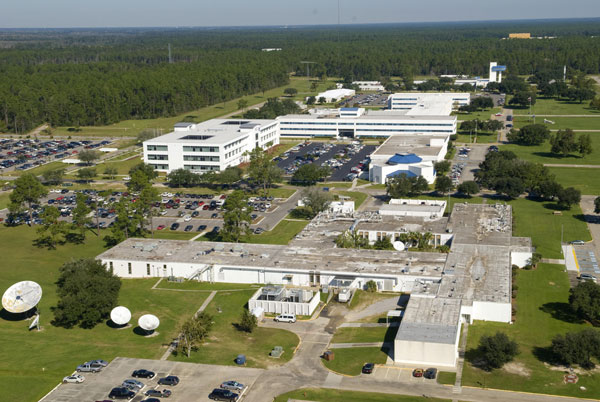More than 5,000 people work at Stennis Space Center in Hancock County, either at NASA, which operates its largest rocket testing facility there, or at the more than 40 companies, agencies and other entities on site. Add such aerospace companies as Lockheed Martin, Airbus, Raytheon, Safran, Northrop Grumman and GE Aviation, among others with operations in Mississippi, and there’s a demand for aerospace talent that few locations can meet.
But Mississippi is uniquely qualified to meet that challenge. It’s home to a dozen higher education institutions that combined awards more than 1,600 engineering certificates and degrees each year. These include the Mississippi State University Department of Aerospace Engineering with degree programs in aerodynamics, flight mechanics and structural mechanics as well as astronautics (spacecraft propulsion, design and controls).
MSU also is home to Raspet Flight Research Laboratory where unmanned aircraft systems (UAS) are researched, developed and tested. It’s an FAA-designated UAS Safety Research Facility and was awarded an $18.7 million, five-year contract from the Department of Homeland Security in 2022. Raspet is charged with testing and evaluating a prototype UAS for DHS and performing cybersecurity vulnerability assessments for UAS applications.
According to the Aerospace Alliance, a four-state consortium working to bring aerospace capital investment and jobs to the Gulf Coast region, Mississippi has seen a 4% growth rate in aerospace and aviation jobs over the last five years; the U.S. growth rate was 0.6% during that time. The Alliance also notes that Mississippi saw a 10% increase in aviation, space and aerospace establishments from 2011 to 2021.
Stennis Space Center Adds Investment
In September 2023, Relativity Space broke ground on a $267 million expansion at Stennis Space Center that includes a new test stand for its Terran R medium- to heavy-lift reusable rocket. The expansion, when announced the previous year, was forecast to create 630 jobs. It involves multiple test stands and other facilities.
“New history is being written at Stennis Space Center as we breathe life into the historic A-2 Test Stand with our Terran R program,” said Tim Ellis, Relativity’s co-founder and CEO at the groundbreaking event. “We appreciate the support from NASA and the state of Mississippi and look forward to continuing to build out our team and testing infrastructure here in the Gulf Coast.
“The scale of Terran R as a medium-heavy lift reusable launch vehicle is substantial,” added Ellis. “Exclusive access to these rare, national-asset facilities through partnership with NASA uniquely enables Relativity to develop a world-class launch vehicle. Together with our significant private capital commitments to reinvigorate these facilities, we are building innovative capabilities to solidify America’s leadership in space.”
In April, NASA completed certification testing at Stennis on Aerojet Rocketdyne’s RS-25 engines that will power the agency’s Space Launch System for Artemis Moon missions. In 2022, according to NASA, the space center had a direct economic impact of $715 million within a 50-mile radius.
The Dawn of Perpetual Flight
In October 2023, Skydweller Aero, based in Oklahoma City, announced a $15 million project to locate its flight testing and aircraft modification work in Hancock County, creating 36 new jobs. The company is developing solar-powered, unmanned aircraft that can fly for 90 days or more at altitudes above 40,000 feet. Skydweller’s wingspan is about the same as that of a Boeing 747, and the aircraft can carry a payload of up to 800 pounds. In April, the company completed its first successful uncrewed flight from Stennis International Airport in Kiln.
“This is a true, world-changing first in the aerospace industry,” said Robert Miller, CEO, Skydweller Aero, in a company release. “Our fleet of uncrewed aircraft will enable a multitude of long-duration missions that support national security and non-terrestrial communications with revolutionary cost savings.”
“We are applying cutting-edge, 21st century materials science, artificial intelligence, and software development to an industry that has spent more than 100 years building piloted, combustion-based aircraft,” Miller added. “This allows Skydweller to leap ahead of heritage aircraft manufacturers in terms of aircraft performance, flight duration and cost effectiveness.”
And it’s happening in Mississippi.

